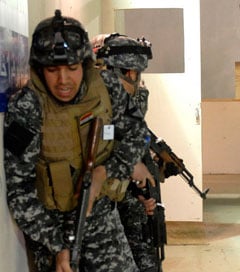Baghdad – An insurgent leader accused of plotting the deadly siege against an Iraqi church last autumn led a bloody, hours-long revolt early Sunday morning inside a Baghdad jail, security authorities said. The jail holds some of the country’s most violent terrorism suspects.
Several inmates seized a cache of grenades and weapons and killed six security officers, including a high-ranking counter-terrorism official. The inmates overran part of the jail until they were beaten back by an Iraqi police assault team at about 4:30 a.m. Ten inmates were killed, the officials said.
It was the latest in a string of riots, jailbreaks and prisoner escapes that have embarrassed government officials and exposed gaping security flaws inside Iraq’s detention system.
“These terrorists took the benefit of carelessness,” said Hakim al-Zamili, who sits on the Iraqi Parliament’s security committee and is a vocal critic of the government. “The Iraqis are using the wrong strategy with prisoners and terrorists.”
Iraqi officials said that the assault appeared to have been planned in advance, but they provided few other details. The office of Prime Minister Nuri Kamal al-Malikireleased a statement saying he had formed a committee to investigate. He ordered security forces to be “more alert” to prevent future breaches.
The violence came amid warnings of heightened attacks in revenge for last week’s killing of Osama bin Laden in Pakistan. Iraqi intelligence officials said the inmates were members of the Sunni extremist group Al Qaeda in Mesopotamia, and that authorities had been interrogating them about possible reprisals for Bin Laden’s death.
On Thursday, a suicide bomber attacked a police training center in the southern Shiite city of Hilla, killing 25 people in an assault that the authorities blamed on Al Qaeda in Mesopotamia.
The melee inside the jail began around midnight when the accused mastermind of the church attack, Huthaifa Al-Batawi, seized a police lieutenant’s pistol, shot him in the head and led the other inmates to rampage through the jail, the officials said.
It was unclear exactly where Mr. Batawi was when he grabbed the gun, but the authorities said that he and the other inmates had not been handcuffed, making it easier for them to overpower their captors, break out of a holding area and overrun the jail.
They killed five other officers, including Brigadier Gen. Moayed al-Saleh, who oversaw counterterrorism operations in Karada, Baghdad’s upper-middle class neighborhood.
As reinforcements arrived, five inmates were killed trying to escape in a stolen police vehicle, and five others were killed later by Iraqi police.
The assault was especially galling because it occurred in the shadow of the heavily guarded headquarters of Iraq’s Interior Ministry and happened in a jail that holds dozens of high-value detainees.
Iraqi politicians were quick to criticize security measures in the facility, where the grenades seized by the inmates had been sitting on a table. Critics said that officers in the jail appeared to underestimate the threat posed by the inmates.
“They are very dangerous, these prisoners,” said Adnan al-Asadi, a former deputy Interior minister and a member of Parliament.
Security officials said that the jail holds about 220 inmates, 38 of whom are said to have been involved in the Oct. 31 assault on the Our Lady of Salvation church.
That attack, the worst against Iraqi Christians since the American invasion, left more than 50 people dead. The violence and uncertainty it wrought helped drive more of the country’s dwindling populations of Christians to seek safety in the north, or out of Iraq entirely.
Mr. Maliki and other top officials promised to hunt down terrorists after the church siege, and in late November, the Interior Ministry announced Mr. Batawi’s arrest with pride, saying he had been captured after “long hard efforts.”
We have 10 days to raise $50,000 — we’re counting on your support!
For those who care about justice, liberation and even the very survival of our species, we must remember our power to take action.
We won’t pretend it’s the only thing you can or should do, but one small step is to pitch in to support Truthout — as one of the last remaining truly independent, nonprofit, reader-funded news platforms, your gift will help keep the facts flowing freely.
